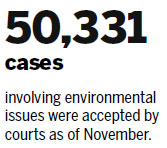
Environmental organizations and prosecuting authorities have been called upon to improve their role in dealing with environment-related cases, as the number of disputes has increased rapidly, an official of China's top court said.
Since Jan 1, when the new Environmental Protection Law came into effect, Chinese courts in 15 provinces and municipalities, such as Guizhou, Gansu and Beijing, have handled 48 environmental public-interest cases, including three administrative ones launched by prosecutors, Wang Xuguang, deputy chief judge of the Environment and Ecology Tribunal under the Supreme People's Court, said on Tuesday.
There were 65 environmental disputes in the public interest from 2007 to 2014, "which means our awareness to protect the environment and solve related problems in legal ways has improved", Wang said.
But such cases still face difficulties in hearings, he said. For example, it is hard for judges to evaluate the damage caused by pollution and how much compensation is due.
Considering the challenges, only 19 public-interest disputes were concluded by the courts this year.
Meanwhile, environmental organizations and prosecutors were also urged to file more environmental public-interest lawsuits after they were given the right to appeal to the court, Wang said.

Earlier this year, the Ministry of Civil Affairs announced that about 700 environmental organizations across the country have been certified to sue in public-interest cases, "but of the 48 cases so far, only nine organizations played a role", he said.
"Some organizations now have little awareness of how to improve their capability to file public-interest lawsuits," he said.
Prosecuting authorities in Guizhou now are pioneers in appealing administrative environmental cases to the courts. Of the three administrative disputes this year, two were from Guizhou prosecutors. "Their experience should be extended across the country," he said.
From January to November, Chinese courts accepted 50,331 environmental cases, of which 2,595 were for compensation, said Wang Ling, deputy director of the top court's information office.
The rising number of environmental disputes has also raised the requirements for courts, asking judges to balance economic development and the environment, she added.
caoyin@chinadaily.com.cn
(China Daily 12/30/2015 page5)